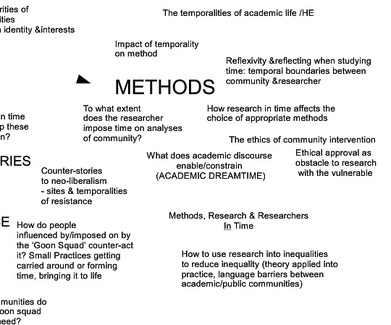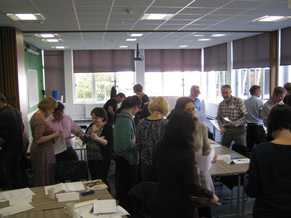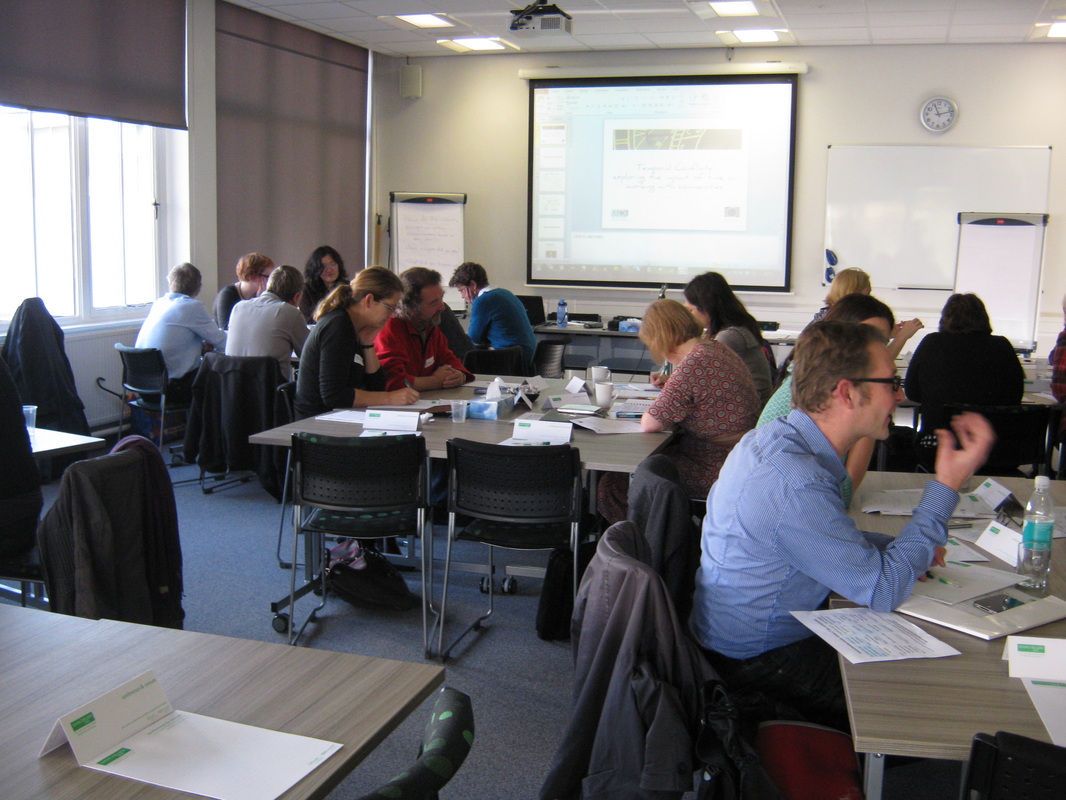Temporal Conflicts: Exploring the impact of time on working with communities
17th October, University of Manchester
Organised by Michelle Bastian and Alison Gilchrist
|
The second Temporal Belongings meeting of 2012 was jointly organised by Michelle Bastian from the University of Manchester and Alison Gilchrist, author of The Well-Connected Community, and co-author of The Short Guide to Community Development. Like our last meeting on Hope and Community Futures it was inspired by themes that came up in our first meeting in 2011. One of the clusters on our affinity map was around the idea of methods, and particularly, how to work with communities once we recognise the way they are always caught up in a variety of timelines, histories and speeds. In planning the workshop, we were also particularly interested in challenging the idea that time was a purely academic problem and so we invited speakers who were working directly with local communities to share their insights and reflections.
So that we could really focus on some of the complex and varied ways time interlinks with community, we organised the day around three key themes. Scheduling/deadlines/pace explored ideas of rhythms, time pressure and conflicting schedules. Interventions took on the time of the 'project' and questioned the idea of these having a neat beginning, middle and end. |
|
Demonstrating progress/success and accepting failure dealt with the 'it's too soon to tell problem' and questions such as 'when is a community developed?'. Alison also wrote a short working paper, which we circulated beforehand.
We were particularly interested in drawing out the way communities are never in only one time, but are characterised by multiple times that need to be negotiated by various actors. Rather than experiencing our work with communities as a steady progress from start to finish, participants at the workshop discussed the way time is experienced as a negotiation with multiple and conflicting deadlines, dynamics, methods, expectations, speeds and paces. Time is not just a flow between past, present and future but is something that can be created by different bureaucratic methods, institutional idiosyncrasies and other methods of organisation. |
|
Importantly, despite our awareness of the complicated and contradictory times of communities we also questioned the way many of the dominant, institutionally-supported methods of working with them continue to be guided by linear models, where an ideal project moves neatly from proposal, initiation, implementation and evaluation.
Presentations Over the course of the day we heard from 14 speakers who addressed one of the three themes. Since we were particularly interested in making room for conversation and knowledge sharing, we used a lightning talk format, where each speaker spoke for only five minutes. Most of these talks are now available online through the links below. You can also listen to Alison's introductory comments here. |
Scheduling/deadlines/pace
- Kevin Harris, Local Level
- Ronnie Hughes, A Sense of Place, Liverpool
- Marli Huijer, Professor in Philosophy of Culture, Politics and Religion, Erasmus University Rotterdam
- Phil Ware, Third Sector Research Centre, University of Birmingham
Interventions
- Katie Jane Hill, Design Researcher
- Larissa Pschetz & Chris Speed Edinburgh College of Art, University of Edinburgh
- Jen Southern, Catalyst, Lancaster University
- Jess Steele, Innovation Director, Locality
Demonstrating progress/success and accepting failure
- Graham Crow, University of Southampton
- Irene Evison, Director & Principal Consultant, Resources for Change
- Angus McCabe, Senior Research Fellow, Third Sector Research Centre, University of Birmingham
- Sally Rawlings, Head, Big Local
- Mandy Wilson, Community Development Consultant
In our final session we then identified key themes that we wanted to discuss further, through the use of open space. These themes were:
- Places <=> Time <=> Space(s)
- Are rural and urban dimensions of time different? What can urban and rural communities learn from one another?
- Methods of understanding/discovering different perceptions of time
- Is it possible to steal/manipulate 'political time'?
- Can we move politicians into 'gardening time'?
- What options do ICT and social media offer to deal with the multiplicity of times?
- What can animals in communities tell us about time?



